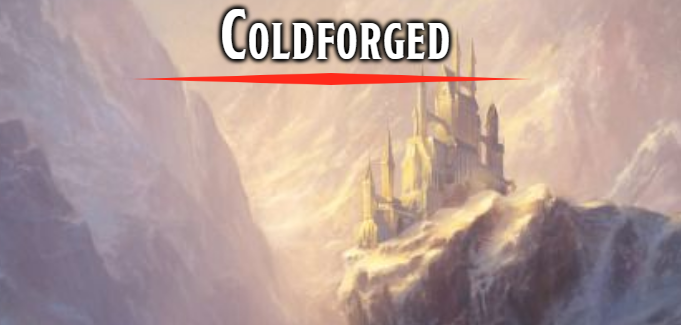
Coldforged: Class Treatment Part 1
Each Thursday this year, I focus on a different aspect of the world I’ve created and played D&D in for over 20 years, in the hopes of honing the ideas and cementing enough in place to settle the world in my own mind. This week I talk about how each class of character is viewed by the different regions and kingdoms. This is the first part of three, as this is a much larger concept than I’d originally anticipated!
Regional Differences
Each region in Tysis holds its own traditions, people and history to be the most important on the continent. Each of these traditions and histories combined creates a culture that views Arcane, Divine, and martial paths differently and looks upon people who take up those professions differently, giving their particular location a feel and style all its own.
Barbarian
- Levisha – Barbarians, though rare, are not unheard of in the forest of Lev. The fey that live within the great woods don’t tend to succumb to the internal rage that it takes to be pure and true barbarian. On the other hand, those that do become fearsome and respected warriors, tapping into the primal strength of the earth itself, becoming the wrath of the storm, the primal rage of nature.
- Thrax – In contrast to the Levishans, those who inhabit the Forest of Thrax rever the barbarian as the pinnacle of what it means to be a warrior. Barbarians often rise to positions of prominence and power within the Thraxian tribes, becoming warlords and leaders of great bands, leading by their prowess and indomitable fury. In Thrax, these people are seen as being possessed by the spirits of great beasts like bears, boars, wolves and even the ancestors long past.
- Killbarum – In Killbarum, there are few true barbarians, and those that exist are looked down with the most utter of contempt. Killbarum exists as a dichotomy to those same barbarians, espousing the nobility of the civilized land, the city, and the rule of law. Here, in the heart of a civilization centuries old, becoming a frothing lunatic who gives in to their basest desires is nothing short of heresy.
- Tyndaria – While the heart of Tyndaria is one of a proud civilization of cities, roads, and business, its wild places are many, and its people embrace both the wilderness spirit and the urban sprawl. While barbarians are looked down on in the most urban of locations, where they are seen as a reminder of a more brutal and dark time, out in the far reaches of the Tyndarian Kingdoms, some of the most revered defenders are those who tap deep into their fury.
- Drimmak – The Drimm people have little love for the chaos and uncontrolled nature of the barbarian, but they do understand the worth of an excellent warrior. While they are few, the barbarians are often left to commit war as they see fit. Their enthusiasm and prowess give them a level of leeway not normally seen in the Drimm military. While they are allowed and given leeway, however, it does not mean they hold a strong or desired position. They are often seen as those who the gods have abandoned, those who are without reason and, often, beyond redemption.
- Brokensail – The corsairs of Brokensail have little time or patience for those who only thrash and froth when they cannot get to their enemy. While their enthusiasm is admired, a ship needs to run like a well-oiled machine, and those who cannot be ready for battle and also hoist a sail or drop anchor are seen as a burden. Few ships will take one aboard as crew.
Bard
- Levisha – The Forest of Lev welcomes bards warmly and with an open heart. They love music and art and magic, and bards combine all three in a beautiful combination. Tales and legends are told again and repeated across the forest to listeners young and old, to preserve history, to entertain and to stir emotion in the hardest of hearts.
- Thrax – Bards in Thrax are a welcome sight as well, though they are of a very different temperament and use in Dark Forest. Bards tap into the primal wellspring of bravery and savagery that lies within each tribe member and brings it to the forefront with powerful chants, deep drums, and hypnotic rhythms. They are the lore keepers and tellers of epic tales, they are the historians and the fearmongers and there is always room in a Thraxian hall for a bard.
- Killbarum – Bards in Killbarum, as arcanists, are already at the top of the social ladder and gather great numbers of spectators to witness their feats of spectacular tale-telling and marvelous exhibitions. Their colleges treat them as novel oddities and they rarely get the same treatment and respect as a true arcanist, but they enjoy the privileges of the arcane even so.
- Tyndaria – In Tyndaria, the bard holds the position of entertainer within the high courts, though they are not seen as part of the courts. These bards are looked at the same as furniture or exotic dinnerware, as but another expense for the nobility, and a luxury that the poor cannot afford. Their spellcasting ability and innate magical powers are often overlooked due to their wandering habits and longstanding prejudices.
- Drimmak – In DrimM, they appreciate the power of strong vocal performances and see their benefit in both combat and in the mead hall. Bards are the rune keepers, the saga singers and the historians of the Drimm, and few clans would tolerate existing for long without one, as who would there be to record the great deeds of the current generation. Who would write the legendary songs to sing far and wide once the heroes are long gone?
- Brokensail – In The Pirate city, there are few who cannot spare even a small coin for the song of a bard. They are welcome on ships as their presence breaks the dreary monotony of day to day life on the water, bringing levity, song, and wit to the depths of the ship. Those few who are graced with a bard on the crew are considered the luckiest of the ships and the most unlikely to be beset by ill luck.
Cleric
- Levisha – While clerics serve a vital function in all societies, they tend to be rarer in Lev, simply due to the individual nature of the land’s spirituality. While almost every person serves a god, they feel little need to be told how or when to do, or what the tenants of their faith should or shouldn’t be. Levishans keep faith in their own way. Still, there are clerics of Marija, Gestril, and Taralin who operate networks of holy places throughout the forest, providing rest and relief to those who come across their works.
- Thrax – The Clerics of Thrax tend to be those of the Brothers: Decarin and Takkanas, and they are treated with no small reverence as those who can tap into the power of their dual creators. They hold some small power within the tribes, but not enough to supplant the traditional structure of chieftains and shamans.
- Killbarum – while divine magic is looked a down on in Killbarum, there is a limited but powerful priesthood within the structure of the society and government. These clerics hold powerful religious duties and are tasked with performing important ceremonies throughout the year.
- Tyndaria – Clerics are one of the pillars that support each of the varied Tyndarian kingdoms. Clerics are seen as strong advisors, knowledgeable assets and powerful allies. In each town, there is at least one church and additional shrines and temples that are attended to by a number of clerics. Clerics hold a special place in the Tyndarian world, one which always commands respect and attention.
- Drimmak – if the Clerics of Tyrndall are one of the pillars of that society, the Clerics of the Drimm are the last remaining pillar. Revered and listened to with great detail, the priests of Drimm are the guiding light and stabilizing focus of a broken people. It is around Clerics that people gather to hear sermons on how the gods have a plan and how they are destined to take back there homeland any day now.
- Brokensail – There are many ships that would like a cleric on the crew, as long as its one of the beneficial gods of the Ocean. Nera, Orana, and Gestril are three that are looked highly upon out on a raid or trading voyage. They are, however, looked down upon if they insist on wearing their heavy, metal armor while sailing the ocean. It’s not great luck to be striding a rolling deck a bunch of unyielding weight.
Druid
- Levisha – Druids are respected and powerful within the forests of Lev. Here, they tend the wild and natural places outside the reach of the settlements, as well as the gardens and woods within the reaches and walls where people dwell. They are seen as wise teachers and knowledgeable individuals within the community, people to go to when you have nowhere else to turn.
- Thrax – In Thrax, druids are the voice of the spirits, the eyes, and ears of the land. Here, in the Dread Forest, they guard the waterfalls and glades, the mountain peaks and the deepest recesses of the forests. here they commune with the spirits of the land, the latent elementals and advise the chieftains that will listen.
- Killbarum – Killbarans have little time for the nature spirits, the visions of the mountains or the sacred spaces of the wild. Instead, they look down on the druid much as they look down on the barbarian as the last vestiges of an older, more brutal time.
- Tyndaria – Tyndarians take a fairly middle ground view of the Druid. They see them as wardens of the gardens and woods of the nobility, but they are very inconvenient when it comes to expanding the cities and towns that they live in towards the wild spaces that need to be tamed. Druids, then, have become a sign of both opulence and the intractability of the natural world.
- Drimmak – There are few places in the mountains that druids would seek to protect or preserve, thought there would be the rare underground lake, or mushroom forest, or barren peak that would draw the attention of a warden. Druids, then, are often looked at as eccentric people who take a liking to something that simply doesn’t need too much attention.
- Brokensail – most often, there is little need in the open ocean for a druid, but there are times when the ocean itself argues, and you need a voice. While the corsairs tend not to have a place for druids of the grasslands or forests, coastal druids, as well as swamp and ocean druids, are always in demand, as are druids who can shift into beings that can scout well ahead of the ship, as a ship with better scouting reports is often the ship that survives.

